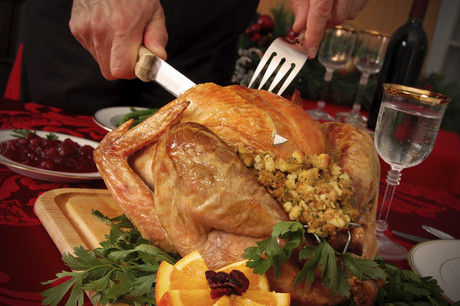The science behind food comas

Ah, Christmastime. It’s the time of year where families get together to indulge in excessively large meals, before lying around for hours on end in a fuzzy-headed stupor. But have you ever wondered about the exact cause of the infamous ‘food coma’?
Until recently, there has been little more than anecdotal evidence to suggest that the food coma is an actual physical condition — and the scientific evidence that does exist is unable to explain why some people fall asleep immediately after eating, some later and some not at all. As noted by Associate Professor William Ja from The Scripps Research Institute (TSRI), “Different foods play different roles in mammalian physiology, but there have been very few studies on the immediate effects of eating on sleep.”
Ja and his colleagues from TSRI, Florida Atlantic University and Bowling Green State University decided to carry out a study on the common fruit fly, due to the well-documented sleep-metabolism interaction in which flies suppress sleep or increase locomotion when starved. They created a system called the Activity Recording CAFE (ARC), a small plastic chamber that allowed them to record fly activity before and after feeding. The results were published in the journal eLife.
The researchers found that after a meal, flies increased sleep for a short period before returning to a normal state of wakefulness. Their response varied according to food intake — flies that ate more also slept more.
“Depending on the amount consumed, the effect ranged from slightly arousing to strongly sleep inducing,” the study authors wrote. Further investigation of specific food components showed that while protein, salt and the amount eaten promoted sleep, sugar had no effect.
“The protein link to post-meal sleep has been mostly anecdotal, too, so to have it turn up in the study was remarkable,” Ja said. “In humans, high sugar consumption provides a quick boost to blood glucose followed by a crash, so its effect on sleep might only be observed beyond the 20- to 40-minute food coma window.”
The fact that larger-sized meals increased sleep in fruit flies may have parallels in human behaviour — it’s known that electrical activity increases in the brain with meal size and during certain stages of sleep. Salt consumption also influences sleep in mammals. Additionally, unpublished data suggests that the food coma might be a way to maximise gut absorption of protein and salt — two nutrients that flies might prioritise or find limited in nature.
“Using an animal model, we’ve learned there is something to the food coma effect, and we can now start to study the direct relationship between food and sleep in earnest,” Ja said. “This behaviour seems conserved across species, so it must be valuable to animals for some reason.”
Personality influences the expression of our genes
An international research team has used artificial intelligence to show that our personalities...
Pig hearts kept alive outside the body for 24 hours
A major hurdle for human heart transplantation is the limited storage time of the donor heart...
Breakthrough antibiotic for mycobacterial infections
The antibiotic candidate, named COE-PNH2, has been optimised to target Mycobacterium...







